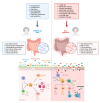The Complex Role of Gut Microbiota in Systemic Lupus Erythematosus and Lupus Nephritis: From Pathogenetic Factor to Therapeutic Target
- PMID: 40005809
- PMCID: PMC11858628
- DOI: 10.3390/microorganisms13020445
The Complex Role of Gut Microbiota in Systemic Lupus Erythematosus and Lupus Nephritis: From Pathogenetic Factor to Therapeutic Target
Abstract
The role of gut microbiota (GM) and intestinal dysbiosis in triggering the onset and/or modulating the severity and progression of lupus nephritis (LN) has been the object of intense research over the last few years. Some alterations at the phyla level, such as the abundance of Proteobacteria and reduction in Firmicutes/Bacteroidetes (F/B) ratio and in α-diversity have been consistently reported in systemic lupus erythematosus (SLE), whereas a more specific role has been ascribed to some species (Bacteroides thetaiotaomicron and Ruminococcus gnavus) in LN. Underlying mechanisms include microbial translocation through a "leaky gut" and subsequent molecular mimicry, immune dysregulation (alteration of IFNγ levels and of balance between Treg and Th17 subsets), and epigenetic interactions. Levels of bacterial metabolites, such as butyrate and other short-chain fatty acids (SCFAs), appear to play a key role in modulating LN. Beyond bacterial components of GM, virome and mycobiome are also increasingly recognized as important players in the modulation of an immune response. On the other hand, microbiota-based therapy appears promising and includes diet, prebiotics, probiotics, symbiotics, and fecal microbiota transplantation (FMT). The modulation of microbiota could correct critical alterations, such as F/B ratio and Treg/Th17 imbalance, and blunt production of autoantibodies and renal damage. Despite current limits, GM is emerging as a powerful environmental factor that could be harnessed to interfere with key mechanisms leading to SLE, preventing flares and organ damage, including LN. The aim of this review is to provide a state-of-the-art analysis of the role of GM in triggering and modulating SLE and LN on the one hand, while exploring possible therapeutic manipulation of GM to control the disease on the other hand.
Keywords: autoimmunity; dysbiosis; fecal microbiota transplant; gut microbiota; lupus nephritis; probiotic; systemic lupus erythematosus.
Conflict of interest statement
The authors declare no conflicts of interest.
Figures




References
Publication types
LinkOut - more resources
Full Text Sources
Molecular Biology Databases

